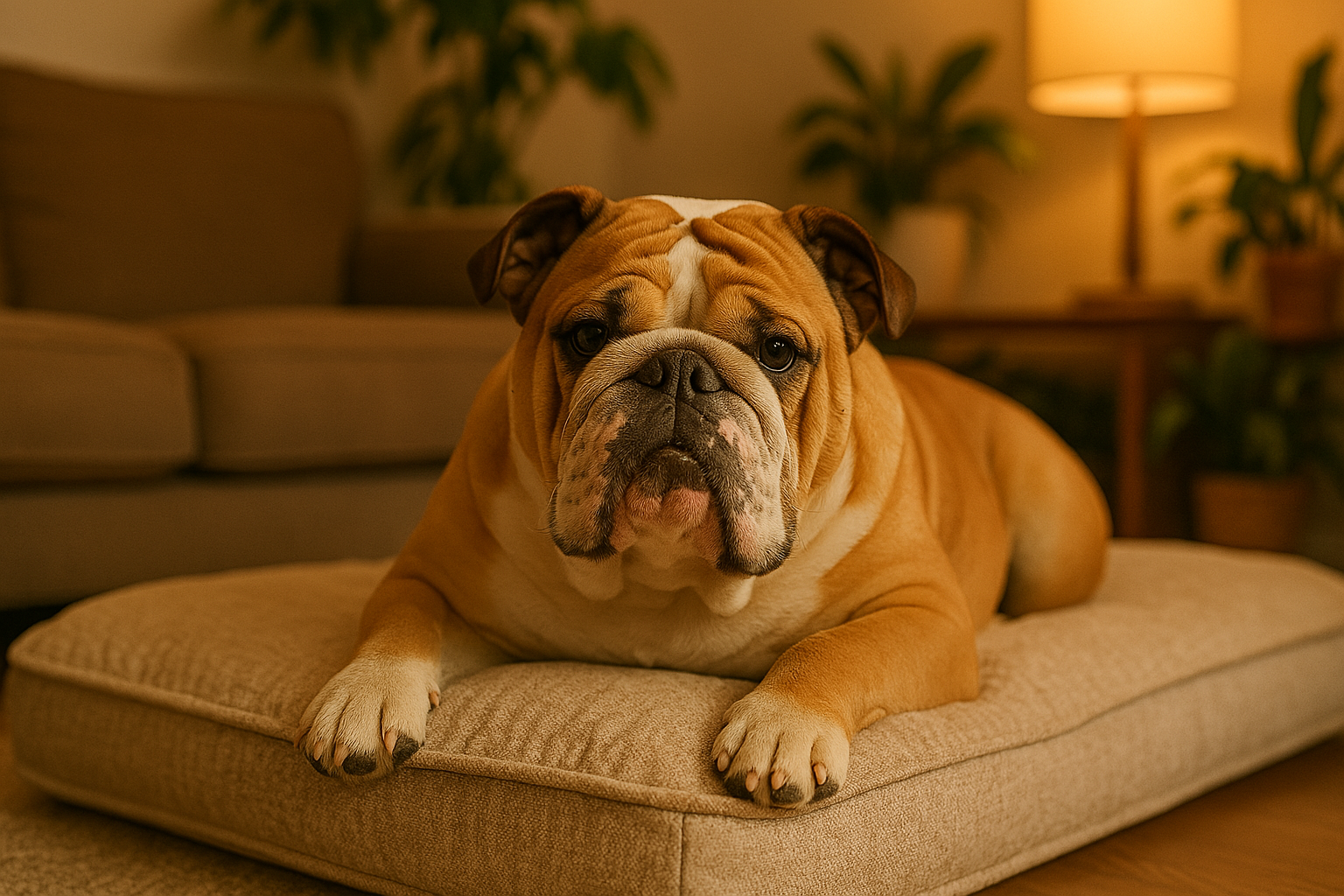Bulldogs, with their distinctive wrinkled faces, stocky bodies, and unmistakable waddle, are one of the most beloved dog breeds around the world. Despite their tough appearance, Bulldogs are incredibly gentle, affectionate, and loyal. They thrive in calm environments and are known for forming strong bonds with their families.
But owning a Bulldog also comes with unique care responsibilities, especially when it comes to their health and comfort. In this guide, you’ll learn how to properly care for a Bulldog and ensure they live a happy, healthy life.
The Bulldog Personality: Calm, Loyal, and Affectionate
Bulldogs are:
- Friendly and people-oriented
- Relaxed and low-energy
- Gentle with children
- Protective without being aggressive
- Affectionate and always ready to cuddle
They make great apartment pets and are especially suitable for families, seniors, and those who prefer a slower-paced lifestyle.
Daily Activity Needs: Less is More
Unlike many energetic breeds, Bulldogs have low exercise requirements. However, they still need daily activity to stay fit and prevent obesity.
Bulldog exercise tips:
- Two short walks per day (10–20 minutes each)
- Avoid exercise during hot or humid weather
- Indoor playtime with soft toys or tug games
- Watch for signs of fatigue or breathing difficulty
Bulldogs are brachycephalic (short-nosed), which makes them prone to overheating and respiratory issues. Always exercise them during cooler hours and avoid intense physical activities.
Grooming and Skin Care
Bulldogs have short coats that are easy to maintain, but their skin folds require special care.
Grooming routine:
- Brush once a week to remove loose fur
- Wipe skin folds daily with a damp cloth or pet-safe wipes
- Dry thoroughly to prevent moisture buildup (which can cause infections)
- Clean ears weekly
- Bathe every 1–2 months or when dirty
- Trim nails monthly
- Brush teeth several times a week
Bulldogs are prone to skin issues, so a consistent grooming routine is essential.
Feeding a Bulldog
Due to their sedentary nature, Bulldogs are at risk for obesity, which can lead to joint problems and breathing issues.
Feeding tips:
- Use high-quality food designed for medium-sized breeds
- Feed measured portions twice a day
- Limit treats and avoid table scraps
- Monitor weight regularly
- Choose foods that support joint and skin health
Always consult your vet to determine the best diet based on age, weight, and activity level.
Living Environment
Bulldogs are indoor dogs. Their compact size and calm demeanor make them perfect for apartment living, but they still need a comfortable environment.
Essentials for a happy Bulldog home:
- Soft bedding (they’re prone to joint issues)
- Access to clean water at all times
- Temperature control (they’re sensitive to heat)
- Ramps or low furniture (to reduce strain on joints)
- Quiet, low-stress surroundings
They do best in homes with air conditioning and minimal stairs.
Health Concerns in Bulldogs
Bulldogs are known for their charming appearance, but it comes with certain health risks that owners should be aware of:
- Brachycephalic syndrome (breathing difficulty)
- Skin infections (especially in folds)
- Hip dysplasia
- Cherry eye
- Obesity-related conditions
- Allergies
Regular vet checkups, proper grooming, and weight management are crucial to preventing and managing these issues.
Bulldog Behavior and Training
Bulldogs are intelligent but can be stubborn, so training should start early and be kept positive and consistent.
Training tips:
- Use treats and praise (they’re food-motivated)
- Keep sessions short (5–10 minutes)
- Be patient — they respond better to kindness than pressure
- Focus on basic obedience, potty training, and leash manners
- Socialize early with people, pets, and new environments
Their calm nature means they rarely act out aggressively, but structure and training are still key to preventing bad habits.
Bulldogs and Children
Bulldogs are fantastic with kids. They’re patient, tolerant, and often happy to be included in family activities — even if it’s just napping nearby.
Safety tips:
- Teach kids to be gentle and respectful
- Supervise play with toddlers
- Avoid roughhousing that could strain the dog’s joints
With the right introductions and supervision, Bulldogs and children make an amazing match.
Travel and Bulldogs
Due to breathing difficulties, Bulldogs are not ideal travel companions, especially on airplanes. If you do travel:
- Avoid flying unless absolutely necessary
- Never leave them in hot cars
- Bring their own bed, food, and water
- Limit stress by maintaining routine
If you travel frequently, consider having a trusted sitter familiar with Bulldogs.
Final Thoughts: Is a Bulldog Right for You?
A Bulldog could be your perfect match if you’re looking for:
- A laid-back, affectionate companion
- A dog that fits well in apartments or small homes
- A loyal friend who loves quiet time and cuddles
- A breed that doesn’t require high-intensity exercise
But they do require extra attention when it comes to skin care, breathing, and weight. If you’re ready for that commitment, you’ll be rewarded with a gentle, goofy, and endlessly lovable dog.

